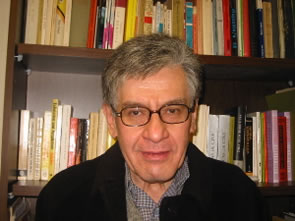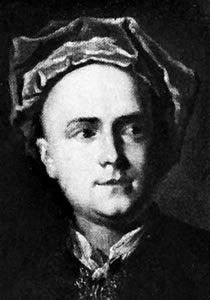De Mexicaanse schrijver, dichter, essayist en vertaler José Emilio Pacheco werd geboren in Mexico City op 30 juni 1939. Hij doceerde literatuur aan diverse universiteiten in de VS en in het Verenigd Koninkrijk. Pacheco’s eerste gedichtenbundel Los elementos de la noche verscheen in 1963 en werd in het zelfde jaar gevolgd door de roman El viento distante.
High treason
I do not love my country. Its abstract splendor
is beyond my grasp.
But (although it sounds bad) I would give my life
for ten places in it, for certain people,
seaports, pinewoods, fortresses,
a run-down city, gray, grotesque,
various figures from its history
mountains
(and three or four rivers).
The elements of the night
Beneath this small, dry empire summer has whittled down,
faith lies toppled—all those tall, farsighted days.
In the last valley
destructiveness is glutted
on conquered cities, affronted by the ash.
Rain extinguishes
the woodland lit by lightning.
Night passes on its venom
Words crack against the air.
Nothing is restored, nothing gives back
that glowing green to the scorched fields.
Neither will the water, in its exile
from the fountain, succeed its own sweet
rise, nor the bones of the eagle fly
through its wings again.
Vertaald door George McWhirter and Alastair Reid

José Emilio Pacheco (Mexico City, 30 juni 1939)
De Kameroense schrijver Mongo Beti (eig. Alexandre Biyidi) werd geboren op 30 juni 1932 in Mbalmayo, een klein dorp ten zuiden van Yaoundé. Beti doceerde literatuur in Rouen. Om politieke redenen moest hij naar Frankrijk vluchten. Na 1992 woonde hij weer in Kameroe. Tot zijn omvangrijke werk behoren de romans »Mission terminée« (1957) und »L’Histoire du fou« (1994).
Uit: Africains, si VOUS PARLIEZ (2005)
« Quoi qu’en disent les radotages de vos théoriciens tiers-mondistes, Monsieur le Président de la République française, quoi qu’en disent les ethnologues d’un autre âge qui s’empressent autour de vous et assurent vous livrer l’âme noire toute nue, un peuple déshérité ne saurait transformer son présent ni conquérir son avenir sans élever la voix et même frapper du poing sur la table.
Dans les dispositions de l’Elysée à l’égard de l’Afrique, rien n’a changé ; c’est toujours le même choix, en faveur des dictateurs, contre les peuples. Les espérances politiques de nos peuples ont été le plus souvent soit trahies, soit mystifiées…
Les pouvoirs franco-africains organisent donc le vide, le silence morose, le côtoiement des individus, des groupes, des catégories, des ethnies, jamais leur dialogue et leur interpénétration, en un mot l’obscurantisme… Broyés par des institutions culturelles dont la fatalité est de nous aliéner, nous prétendons créer une littérature qui soit l’expression authentique de notre moi collectif.
Si les Français se bouchèrent jadis les oreilles, quand nous tentions de leur conter l’histoire somme toute fade de notre résistance sous la colonisation, niant que celle-ci ait jamais eu le visage que nos plumes perverses s’obstinaient à tracer, que feront-ils a fortiori lorsque nous en viendrons fatalement à conter l’histoire atroce de trente ans de néo-colonialisme ?
Il faut nécessairement que nous la racontions, cette histoire-là. A nos enfants d’abord, parce que c’est un devoir de se transmettre de génération en génération les histoires sans lesquelles il n’y a pas d’histoire ni de mémoire collective. »

Mongo Beti (30 juni 1932 – 8 oktober 2001)
De Poolse dichter, schrijver en Nobelprijswinnaar Czesław Miłosz werd geboren in Šeteniai op 30 juni 1911. Zie ook mijn blog van 30 juni 2006.
A Song on the End of the World
On the day the world ends
A bee circles a clover,
A fisherman mends a glimmering net.
Happy porpoises jump in the sea,
By the rainspout young sparrows are playing
And the snake is gold-skinned as it should always be.
On the day the world ends
Women walk through the fields under their umbrellas,
A drunkard grows sleepy at the edge of a lawn,
Vegetable peddlers shout in the street
And a yellow-sailed boat comes nearer the island,
The voice of a violin lasts in the air
And leads into a starry night.
And those who expected lightning
and thunder
Are disappointed.
And those who expected signs and archangels’ trumps
Do not believe it is happening now.
As long as the sun and the moon are above,
As long as the bumblebee visits a rose,
As long as rosy infants are born
No one believes it is happening now.
Only a white-haired old man, who would be a prophet
Yet is not a prophet, for he’s much too busy,
Repeats while he binds his tomatoes:
There will be no other end of the world,
There will be no other end of the world.
So Little
I said so little.
Days were short.
Short days.
Short nights.
Short years.
I said so little.
I couldn’t keep up.
My heart grew weary
From joy,
Despair,
Ardor,
Hope.
The jaws of Leviathan
Were closing upon me.
Naked, I lay on the shores
Of desert islands.
The white whale of the world
Hauled me down to its pit.
And now I don’t know
What in all that was real.
Vertaald door Czeslaw Milosz and Lillian Vallee

Czeslaw Milosz (30 juni 1911 – 14 augustus 2004)
De Franse romanschrijver en essayist Georges Duhamel werd geboren op 30 juni 1884 in Parijs. De bioloog en medicus werd lid van de Académie francaise in 1935. Als arts maakte hij van zeer nabij de gruwelen van de Eerste Wereldoorlog mee, die hij heeft beschreven in de novellenbundels Vie des martyrs en Civilisation. Duhamels problematiek van de onbeduidende, alledaagse, twijfelende mens, symbool voor de mensheid als geheel, was zijn tijd vooruit. Zijn roman Confession de minuit, de eerste van een reeks over hoofdpersoon Salavin, een typische antiheld, werd bekroond met de Prix Goncourt.
Uit: Scènes de la vie future
“Toutes les œuvres qui ont tenu quelque place dans ma vie, toutes les œuvres d’art dont la connaissance a fait de moi un homme, représentaient, d’abord, une conquête. J’ai dû les aborder de haute lutte et les mériter après une fervente passion. Il n’y a pas lieu, jusqu’à nouvel ordre, de conquérir l’œuvre cinématographique. Elle ne soumet notre esprit et notre cœur à nulle épreuve. Elle nous dit tout de suite tout ce qu’elle sait. Elle est sans mystère, sans détours, sans tréfonds, sans réserves. Elle s’évertue pour nous combler et nous procure toujours une pénible sensation d’inassouvissement. Par nature, elle est mouvement ; mais elle nous laisse immobiles, appesantis et comme paralytiques.
Beethoven, Wagner, Baudelaire, Mallarmé, Giorgione, Vinci – je cite pêle-mêle, j’en appelle six, il y en a cent, voilà vraiment l’art. Pour comprendre l’œuvre de ces grands hommes, pour en exprimer, en humer le suc, j’ai fait, je fais toujours des efforts qui m’élèvent au-dessus de moi-même et qui comptent parmi les plus joyeuses victoires de ma vie. Le cinéma parfois m’a diverti, parfois même ému ; jamais il ne m’a demandé de me surpasser. Ce n’est pas un art, ce n’est pas l’art. »

Georges Duhamel (30 juni 1884 – 13 april 1966)
De Engelse dichter en dramaturg John Gay werd op 30 juni 1685 geboren in Barnstaple, Devon. Gay was van 1712 tot 1714 secretaris van de hertogin van Monmouth. In 1713 verscheen het gedicht Rural sports, opgedragen aan Alexander Pope, met wie hij bevriend was. In 1714 publiceerde hij Gay’s Sheperd’s week, een serie herdersgedichten. In 1716 verscheen Trivia, or the Art of Walking the Streets of London, een gedicht in drie delen, mede geïnspireerd door Jonathan Swift. In 1727 verscheen zijn eerste serie van de populaire Fables.
The beggar’s opera, waarvan de eerste uitvoering plaats vond in 1728, in Londen, was een reactie op de toenemende invloed van de Italiaanse opera en met name gericht op Georg Friedrich Händel. Qua werk was het niet alleen bedoeld als persiflage ten aanzien van de Italiaanse opera, maar gaf het ook de mogelijkheid, middels satirische teksten, kritiek te leveren op het corrupte bestuur van de eerste minister Sir Robert Walpole. Ook verschenen er voor het eerst gewone mensen op het toneel.
Uit: The Beggar’s Opera
FILCH.
‘Tis Woman that seduces all Mankind,
By her we first were taught the wheedling Arts:
Her very Eyes can cheat; when most she’s kind,
She tricks us of our Money with our Hearts.
For her, like Wolves by Night we roam for Prey,
And practise ev’ry Fraud, to bribe her Charms;
For suits of Love, like Law, are won by Pay,
And Beauty must be fee’d into our Arms.
PEACHUM. But make haste to Newgate, Boy, and let my Friends know what I intend; for I love to make them easy one way or other.
FILCH. When a Gentleman is long kept in suspence, Penitence may break his Spirit ever after. Besides, Certainty gives a Man a good Air upon his Trial, and makes him risque another without Fear or Scruple. But I’ll away, for ’tis a Pleasure to be the Messenger of Comfort to Friends in Affliction.

John Gay (30 juni 1685 – 4 december 1732)
De Engelse dichter Thomas Lovell Beddoes werd geboren op 30 juni 1803 in Clifton. Hij studeerde aan het Pembroke College in Oxford. Daar baarde hij opzien met zijn – later door hem verloochende – verzameling gedichten The improvisatore (1821) en met de dramatische compositie The bride’s tragedy (1822). Ook bezocht hij universiteiten in Duitsland tot hij vanwege zijn radicale politieke opvattingen in 1833 verbannen werd uit Beieren en naar Zwitserland uitweek. Zijn dichterlijke nalatenschap verscheen onder de titel Poems, with a memoir in 1851.
A BEAUTIFUL NIGHT
How lovely is the heaven of this night,
How deadly still its earth! The forest brute
Has crept into his cave, and laid himself
Where sleep has made him harmless like the lamb.
The horrid snake, his venom now forgot,
Is still and innocent as the honied flower
Under his head: and man, in whom are met
Leopard and snake, and all the gentleness
And beauty of the young lamb and the bud,
Has let his ghost out, put his thoughts aside
And lent his senses unto death himself.
A DAY OF SURPASSING BEAUTY
The earth is bright, her forests all are golden;
A cloud of flowers breathes blushing over her,
And, whispering from bud to blossom, opens
The half-awakened memory of the song
She heard in childhood from the mystic sun.
There is some secret stirring in the world,
A thought that seeks impatiently its word:
A crown, or cross, for one is born to day.

Thomas Lovell Beddoes (20 juni 1803 – 26 januari 1849)
